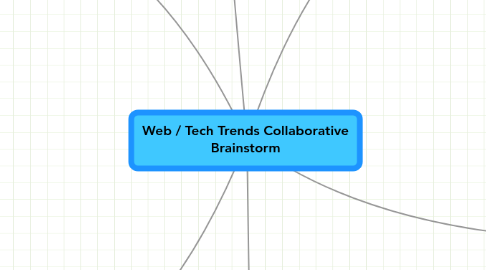Web / Tech Trends Collaborative Brainstorm
by Justin Charles

1. Mobile Devices (Kyle Prier)
1.1. Mobile communication has improved dramatically in recent years Today we can make "fictional" futuristic devices / applications a reality
1.2. Microchip attached to the body analyzing / streamline behavior
1.3. Applications that can make your mobile device a "life remote control"
1.4. Mobile devices that capture data about our behavior and matches products / services to us personally
1.5. Education / learning via mobile devices
1.6. How can we help human behavior with mobile devices or help humans to limit information / tech consumption?
2. Online Presence (Garrett Gee)
2.1. Social networks are a powerful channel for establishing an online presence Carefully crafted email addresses can influence your online perception Having an online channel is not enough without active output / messaging
2.2. "Snow Crash" content creation that is monetized in some way by consumers
2.3. Social sphere of influence "credits" that establishes credibility and "power" on the social layer
2.4. With so much content how can we filter what is important only to a specific user?
2.5. Information overload / data consumption is a problem that needs to be solved
3. The Role of the Entrepreneur (Jeremy Hanks)
3.1. Increased difficulty in the economy have lead to increased support for entrepreneurs In the current economic state there is greater opportunity for disruptive ideas and new leaders
3.2. Focus functionality can help us dominate a specific need / pain
3.3. Don't change your major even if you see programming or other processes become automated or outsourced
3.4. Think about how you can pioneer the area where your work has become "automated"
3.5. Play to core competencies and don't overload users with things that they may use, but as humans it's too much for us
4. Collaborative Consumption (Matt Smith)
4.1. We have a lot of junk that we don't really need / want. What can we do with our unused items? How can we connect with our unused items?
4.2. Computing power being wasted (software that can lend computing power)
4.3. How can we group / divide the social layer by user interests?
4.4. Platforms that can streamline crowdsourcing
5. Principles of Engagement (Aaron Johnson)
5.1. Incentives for engagement (Remunerative, Moral, Coercive) How can we incentivize others to influence behavior? Gaming mechanisms How can we make games out of otherwise painstaking tasks?
5.2. Tapping into the education system with gaming or other engagement mechanisms
5.3. Gaming in programming / other simple tasks
5.4. "You Are Not a Gadget" maybe opposite of gaming there will be demand for online services to take things offline
5.5. Processing content / data mining
5.6. Use the principles of engagement to change human behavior in a good way (breaking addictions, reduce obesity, increase real life interaction)
6. Content Management System (Kirk Ouimet)
6.1. Traditional website development is shifting to CMS-based sites Website Monster templates can make web development easier Power shifts from the web programmer to the business owner Opportunity for CMS specialization
6.2. Video editing / publishing in quality and ease
6.3. Filtering of published content
6.4. Content discovery systems (search, networking)
6.5. Facebook data
6.6. A "template based" that eliminate pains of UX (user experience design)
6.7. Verticals on WordPress forming a 2nd layer
6.8. Search tools that can be more personalized for the user
6.9. Information overload is a problem that needs to be solved


